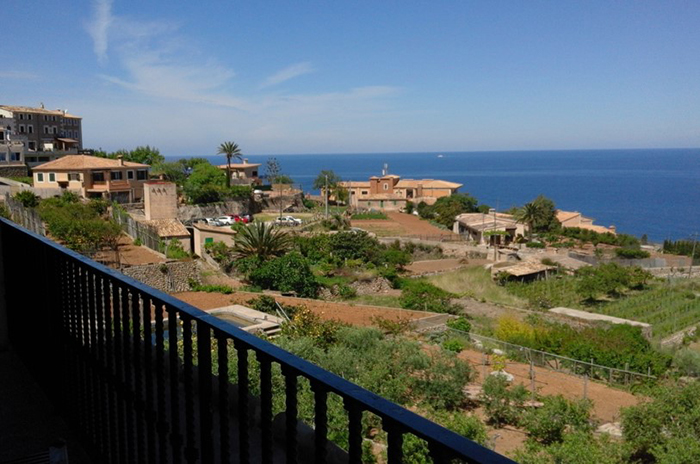Case Study
A Tourist Ecotax used to fund an Eco-scheme: Public payments for agroecology ecosystem services in the Balearic Islands
Contact name
Enric Tello
Institution name
University of Barcelona
Region & country
Balearic Islands, Spain
Summary
World travel agencies use the beautiful images of agricultural landscapes of Mallorca, Menorca, and Ibiza as an intangible asset without paying for it. Nevertheless, being a global tourist spot jeopardizes the future of these landscapes with the huge income gap among the two sectors, exerting strong pressure on farmers to give up. This would not only create a food desert on the islands, losing the near provisioning of food that has allowed the residents to cope with the COVID 19 pandemic. It would also put an end to the other regulatory, supporting, and cultural ecosystem services the agroecology landscapes provide. To avoid that requires a public eco-scheme to pay for them to those who keep this biocultural heritage alive.

Banyalbufar, Mallorca.
Enric Tello
Background of the project
Until 2016, the regional and the Spanish governments did not pay much attention to agriculture. It was considered too small a part of the economy to deserve more care. However, despite the tiny funds dedicated to agriculture, the government of the Balearic Islands made significant efforts in nature protection in Menorca and Mallorca as well as to maintain the built heritage of the physical landscape, such as stone walls, terraces, and canals.
Environmental NGOs (GOB), associations of organic farmers (APAEMA), and citizen initiatives for the maintenance of sheep (Mallorca) and cattle (Menorca) grazing or local seed and livestock varieties, called for public support to wildlife-friendly farming and landscape care. Scientists studying the rich biocultural heritage and its role in biodiversity conservation, drew attention to the risks involved in rural abandonment. These efforts led to a claim for the conservation of cultural landscapes.
Solution and actions taken
The solution was to allocate part of the tourist tax collection to pay farmers for the maintenance and improvement of agricultural landscapes that provide ecosystem services in the Balearic Islands. This idea was proposed at a seminar organized by the international research project on Sustainable Agricultural Systems: Long-term socio-ecological metabolism in Western agriculture held in Palma de Mallorca in 2016. The proposal started in 2017, and continues after being stopped during the pandemic.
A commission with the participation of organic farmers (APAEMA, by a technician researching the SFS project) agreed on the grant offered in 2017 with an order stating that “rural abandonment, especially of farms kept in an extensive management […] leads to a loss of the agricultural functions on the rural space”. Therefore, “it is necessary to give a new impetus to the agricultural sector by making visible the benefits that agrarian activity brings to society beyond the production of food”.
Other institutions or parties involved
Among the participants in the 2016 seminar were: FOGAIBA; Conselleria de Medi Ambient, Agricultura i Pesca; IBANAT; Consell de Mallorca; SEMILLA; CBPAE; GOB; ASAJA; APAEMA; Associació Varietats Locals; UCABAL; UIB; UB; IERMB-UAB; UdG
Results
The grants for landscape maintenance grew from 2.6M€ in 2017 (14% of the tourist tax for 643 farmers with 3,925€ on average); to 2.9M€ in 2018 (5% of the tourist tax for 725 farmers with 3,937€ on average), and 3.17M€ in 2019 (6.5% of the tourist tax, the number of farmers not yet known). The grants were given only to full-professional farmers (some 10% of the total, that cultivate a quarter of all agricultural land), excluding part-time small peasants. In 2020-2021 the pandemic stopped them.
Challenges
The proposal was very well received and approved, thanks to the previous existence of many local bottom-up initiatives. Difficulties arose after implementation. The relationship with the provision of ecosystem services was blurred, and most part-time small farmers were excluded from the grants, reducing their coherence and impact. The main problem has been the COVID 19 pandemic that stopped the collection of tourist taxes and subsidies in 2020-20
Lessons learned
• This experience of paying farmers for ecosystem services inspired other proposals in Catalonia, like cultivation contracts in the Collserola Natural Park, or pays for improving agricultural landscapes in the Girona County of Les Gavarres.
• To base them on a tourist tax is especially indicated in other islands with large tourist economies but involves a dependence that suspended it during the pandemic.
• Part-time farmers should not be excluded
Contact name
Enric Tello
Institution name
University of Barcelona
Website(s)
